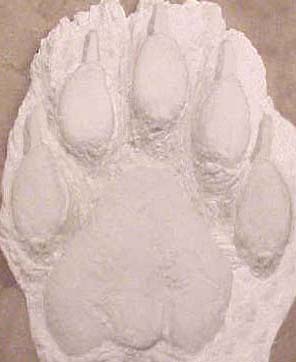

Historical Tales | News | Vampires | Zombies | Werewolves
Virtual Academy | Weapons | Links | Forum
 |
 |
Historical Tales | News | Vampires | Zombies | Werewolves Virtual Academy | Weapons | Links | Forum |
Return to Part I
![]() Your life just got a whole lot more exciting with the report of a possible werewolf in the mountains outside of town. Just don't let your alacrity cloud your judgment. Tread carefully as you continue with your investigation into the Beast of Bozeman.
Your life just got a whole lot more exciting with the report of a possible werewolf in the mountains outside of town. Just don't let your alacrity cloud your judgment. Tread carefully as you continue with your investigation into the Beast of Bozeman.
Date: September 20, 1962
Place: Bozeman, Montana
You throw your footprint cast kit in the back of your pickup truck and drive out to Tom Sowers' ranch to proceed with the investigation. Sowers leads you to the spot where he saw the creature dragging a calf into the woods the previous evening. There are numerous prints in the mud leading from the stockade into the woods.
Crouching down over a particularly deep, clear print, you mutter the words "holy shit." Yep. It's a werewolf. Has to be. Too narrow and arched to be from a bear, too big to be from a wolf. You look into the woods and a chill runs through you. Somewhere up there is the most formidable killing machine in existence. In those woods. In your jurisdiction. You knew at some point in your life, God or nature or whoever would call upon you to take on an extraordinary burden, and this appears to be that time.
 |
| Cast of a werewolf footprint |
"Well, what should I do?" asks Sowers.
"You might wanna find another place to stay for a few days," you answer.
Back at the office, you call the FVZA regional director in Denver to inform him of your findings. He is mystified, remarking that it's been years since the agency has had a werewolf case. He gives you the number of a retired agent by the name of Earl Haggerty who worked a werewolf case back in the 40s in Michigan's upper peninsula.
You call Earl Haggerty at his home in Texas. The old timer's hearing is bad, and you have to shout into the phone. Still, you get a sense that retirement doesn't suit him, especially after he practically jumps at your request for help. "I'll be in Bozeman tomorrow," he says.
You spend much of the afternoon perusing a werewolf manual that had been collecting desk up on the bookshelf. You learn that werewolves have an extremely wide hunting range; that they move with unparalled stealth; that there is nothing they won't eat, including humans.
It's almost dark when the phone rings. The voice on the other end of the line identifies himself as the Medical Examiner. "Can you come over right away?" he asks.
Twenty minutes later, you're standing with the grim-faced examiner and an equally troubled-looking Fish and Wildlife official in front of a slab in the middle of the morgue. The examiner pulls back the sheet and there, on the stainless steel slab, are two bodies. Or what's left of them: decapitated heads, dismembered arms and legs gnawed to the bone. If that's not bad enough, the Fish and Wildlife guy tells you that he found the remains strung from a tree up by Cascade Creek. Based on evidence at and near the scene, the men had been hunting when they were attacked. Their truck is still at the trailhead.
As you're examining the bite marks on one of the victim's femurs, the Fish and Wildlife guy says "whatever did this wanted to send a message."
You resist the urge to say "no shit, Sherlock."
Later, you walk out of the examiner's office shaken to the core. Did your werewolf do this? And if so, why would it display its victims in such a way?
 Investigate the crime scene immediately, before it's compromised.
Investigate the crime scene immediately, before it's compromised.
 Call the local media and spread the word. The area residents have a right to know about this danger.
Call the local media and spread the word. The area residents have a right to know about this danger.